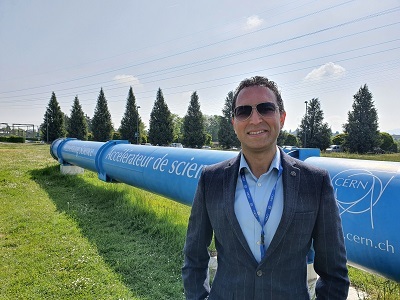THE LATEST
UK prof Nawaz deploys new algorithm for reconstructing particles at the LHC
 The Large Hadron Collider (LHC) is the most powerful particle accelerator ever built which sits in a tunnel 100 meters underground at CERN, the European Organisation for Nuclear Research, near Geneva in Switzerland. It is the site of long-running experiments which enable physicists worldwide to learn more about the nature of the Universe.
The Large Hadron Collider (LHC) is the most powerful particle accelerator ever built which sits in a tunnel 100 meters underground at CERN, the European Organisation for Nuclear Research, near Geneva in Switzerland. It is the site of long-running experiments which enable physicists worldwide to learn more about the nature of the Universe.
The project is part of the Compact Muon Solenoid (CMS) experiment – one of seven installed experiments that use detectors to analyze the particles produced by collisions in the accelerator.
The subject of a new study on in high occupancy imaging calorimeters with graph neural networks, the project has been carried out ahead of the high luminosity upgrade of the Large Hadron Collider. The High Luminosity Large Hadron Collider (HL-LHC) project aims to crank up the performance of the LHC to increase the potential for discoveries after 2029. The HL-LHC will increase the number of proton-proton interactions in an event from 40 to 200.
Professor Raheel Nawaz, Pro Vice-Chancellor for Digital Transformation, at Staffordshire University, has supervised the research. He explained: “Limiting the increase of computing resource consumption at large pileups is a necessary step for the success of the HL-LHC physics program and we are advocating the use of modern machine learning techniques to perform particle reconstruction as a possible solution to this problem.”
He added: “This project has been both a joy and a privilege to work on and is likely to dictate the future direction of research on particle reconstruction by using more advanced AI-based solution.”
Dr. Jan Kieseler from the Experimental Physics Department at CERN added: "This is the first single-shot reconstruction of about 1000 particles from and in an unprecedentedly challenging environment with 200 simultaneous interactions each proton-proton collision. Showing that this novel approach, combining dedicated graph neural network layers (GravNet) and training methods (Object Condensation), can be extended to such challenging tasks while staying within resource constraints represents an important milestone towards future particle reconstruction.”
Shah Rukh Qasim, leading this project as part of his Ph.D. at CERN and Manchester Metropolitan University, said: "The amount of progress we have made on this project in the last three years is truly remarkable. It was hard to imagine we would reach this milestone when we started!"
Professor Martin Jones, Vice-Chancellor and Chief Executive at Staffordshire University, added: “CERN is one of the world’s most respected centers for scientific research and I congratulate the researchers on this project which is effectively paving the way for even greater discoveries in years to come.
“Artificial Intelligence is continuously evolving to benefit many different industries and to know that academics at Staffordshire University and elsewhere are contributing to the research behind such advancements is both exciting and significant.”
